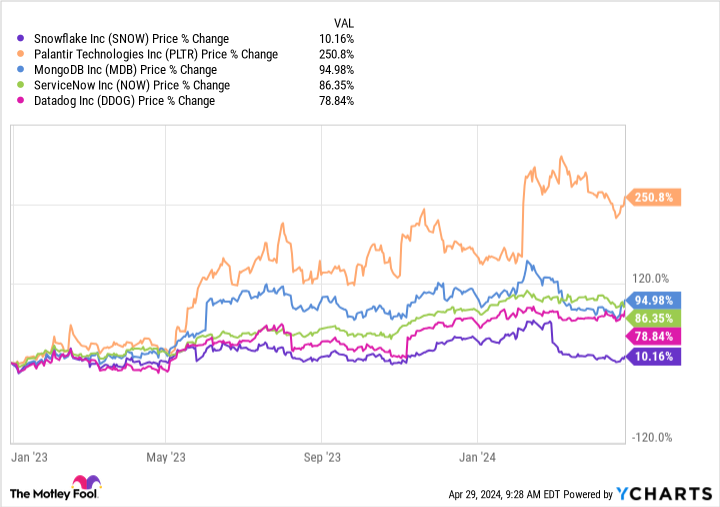Here’s 1 Artificial Intelligence (AI) Stock I’m Avoiding Like the Plague

Artificial intelligence is garnering a lot of hype right now, but one notable name in the space is falling behind.
2024 has gotten off to a sizzling start in the stock market. The S&P 500 is up 7%, while the tech-heavy Nasdaq Composite has rallied 6% as artificial intelligence (AI) euphoria continues to dominate.
One company that seems to have lost its groove, however, is Snowflake (SNOW 0.35%). Shares of the database management company are down 21% so far this year. The reason? Concerns are growing that Snowflake has fallen behind in the AI gold rush.
Let’s dig into the current status of Snowflake and analyze why this once high-flying stock could continue spiraling downward.
A fall from grace
In Sept. 2020, Snowflake brought the heat following its highly anticipated initial public offering (IPO). In fact, Snowflake was the biggest software IPO of all time.
In the months following its debut on the New York Stock Exchange, Snowflake’s market cap rocketed to over $100 billion. But after peaking at a valuation of $123 billion at the end of 2021, Snowflake is now worth just slightly more than $50 billion.
Data by YCharts.
The competition is winning so far
Over the last year, one of the dominant themes fueling the capital markets has been AI.
Many of Snowflake’s software-as-a-service (SaaS) peers such as Palantir, ServiceNow, Datadog, and MongoDB have made notable strides in the AI realm with their stocks surging as a result.
That hasn’t been the case for Snowflake, which also saw a sharp selloff earlier this year following the abrupt departure of CEO Frank Slootman. Snowflake investors have been left with little to cheer about.
Data by YCharts.
One of Snowflake’s primary competitors is AI and machine learning start-up Databricks, a private company that boasts “Magnificent Seven” member Nvidia as one of its investors.
Earlier this month, Databricks CEO Ali Ghodsi dissed Snowflake during an interview with Bloomberg. Ghodsi proclaimed that Snowflake “basically was not doing any AI whatsoever.”
While this is just the opinion of one competitor, Ghodsi’s rationale was interesting. He went on to explain the primary functionality of Snowflake’s data warehousing software is to ask questions about the past. However, he alludes that AI aims to be a “predictive” tool.
It’s hard to argue with Ghodsi. While I’ve expressed previously that I don’t see Snowflake as a direct threat to Palantir, the two companies are often benchmarked against one another in the world of enterprise software.
2023 was a milestone year for Palantir — the company’s successful inroads in AI have helped generate strong growth on both the top and bottom lines.
With investors souring on Snowflake, let’s assess some moves the company is making and what it could mean in the long run.
The blizzard is far from over
Although Slootman’s departure was jarring, there was a silver lining. Snowflake named Sridhar Ramaswamy as its new CEO. His prior role at the company? Senior vice president of AI.
Ramaswamy actually joined Snowflake in May 2023 after the company acquired his AI start-up Neeva. Prior to co-founding Neeva, Ramaswamy spent 15 years at Alphabet growing its advertising business into a $100 billion empire.
Overall, I’m cautiously optimistic about this change in leadership. Ramaswamy has experience in both bringing new products to market and applications revolving around AI.
Since Ramaswamy assumed the CEO position at the end of February, Snowflake has already made a major announcement. In late April, the company released its own large language model, called Arctic. According to the press release, Arctic is most comparable to Meta‘s Llama generative AI model.
For now, I’d sit on the sidelines and keep an eye on Snowflake. Considering how volatile the stock has been and the evolving AI landscape, Snowflake could continue sliding if it doesn’t start gaining ground against its competitors.
While Ramaswamy very well may be an upgrade from prior management, investors should wait for proof his vision is driving the company forward. The release of Arctic clearly demonstrates Snowflake’s commitment to AI, but the question is if such moves are simply too little, too late.
Suzanne Frey, an executive at Alphabet, is a member of The Motley Fool’s board of directors. Randi Zuckerberg, a former director of market development and spokeswoman for Facebook and sister to Meta Platforms CEO Mark Zuckerberg, is a member of The Motley Fool’s board of directors. Adam Spatacco has positions in Alphabet, Meta Platforms, Nvidia, and Palantir Technologies. The Motley Fool has positions in and recommends Alphabet, Datadog, Meta Platforms, MongoDB, Nvidia, Palantir Technologies, ServiceNow, and Snowflake. The Motley Fool has a disclosure policy.




